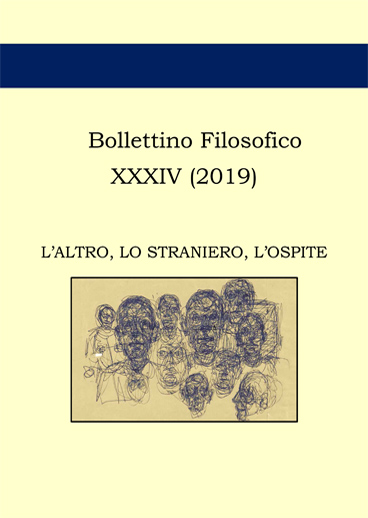L’altro altrimenti possibile: sul pensare contro se stesso. Un dialogo tra Primo Levi e Theodor W. Adorno
Abstract
In the time between If This is a Man and The Drowned and the Saved, Primo Levi becomes aware of how much he has been a witness of the failure of culture, the failure of which Auschwitz represents its emblem. The present reconstructs some pages of Levi – pages of testimony those of 1947, pages of reflection those of 1986 – and interprets them in the development of critical theory elaborated by Horkheimer and Adorno during the 1930s and the mid-1940s. Horkheimer's refusal of Hegelian reconciliation of subject and object (I and Other) in the identity of the State and of the bourgeois Kultur – refusal that leads Horkheimer first to clarify the current state of the philosophy of society (1931) and then to elaborate a critical and philosophical theory of society, which is capable of analyzing the betrayal of bourgeois (instrumental) reason and of the authoritarian state (1937) – presents an important implication in the analysis of anti-Semitism and in the explanation of National Socialism, as historical expressions of the catastrophe of reconciliation. This, together with Adorno's subsequent reflections on the failure of Kultur, his many questions about the meaning of post-Auschwitz, his questions about ideological reification as a reaction of the false conscience with respect to failure, to his investigation into the liquidation of individual as a nullification of the logic of recognition of the I and of the Other, can be an important contribution to the reflection, that not only accompanies those of Levi, but may be able to respond to some of its requests unmasking, at the same time, the hypocrisy and the falseness of the self-preservation of a subjectivity that has nullified the Otherness in an apparent conciliation.
Keywords: Reason, Kultur, Conciliation, Barbarism Auschwitz
Downloads
Bollettino Filosofico pubblica in internet, ad accesso aperto, con licenza:
|
|
CCPL Creative Commons Attribution |
L'autore conserva il copyright sul suo contributo, consentendo tuttavia a chiunque "di riprodurre, distribuire, comunicare al pubblico, esporre in pubblico, rappresentare, eseguire e recitare l'opera", purché siano correttamente citati l'autore e il titolo della rivista. L’autore, al momento della proposta di pubblicazione, è inoltre tenuto a dichiarare che il contenuto e l’organizzazione dell’opera è originale e non compromette in alcun modo i diritti di terzi, né gli obblighi connessi alla salvaguardia di diritti morali ed economici di altri autori o di altri aventi diritto, sia per testi, immagini, foto, tabelle, sia per altre parti di cui il contributo può essere composto. L’autore dichiara altresì di essere a conoscenza delle sanzioni previste dal codice penale e dalle leggi speciali per l’ipotesi di falsità in atti ed uso di atti falsi, e che pertanto Bollettino Filosofico è esente da qualsiasi responsabilità di qualsivoglia natura, civile, amministrativa o penale, e sarà dall'autore tenuta indenne da qualsiasi richiesta o rivendicazione da parte di terzi.
